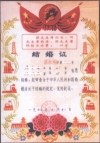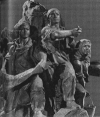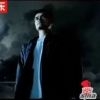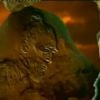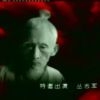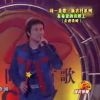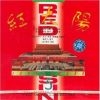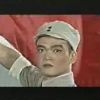Media file:
vid. 4.3
Title:
Linux Revolutionary Song
Source:
Heidelberg catalogue entry, DACHS Archive
Keywords:
revolutionary song, advertisement, Li Ning, Linux, Mao's words, gesture, model works, Lei Feng, hero, red flag
Linux Revolutionary Song
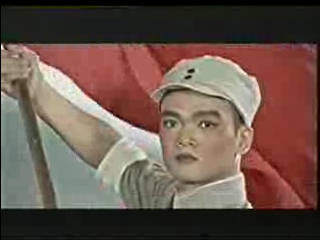
Perhaps the most powerful indication of the enduring popular importance of Mao’s words is their continued use in commercial advertising, in spite of a law that actually prohibits such behavior. Products as different as a Lei Feng model running shoe (ill. 4.20) by Chinese would-be Nike rival Li Ning and Chinese Linux 2000 software both use Mao’s words and Maoist aesthetics to sell their products (without interference by the government). Chinese Linux 2000 was introduced in February 2001 in the form of a peculiar nineteen-second-short mix of model opera, quotation song, and loyalty dance to be seen here performed not with Little Red Books but with Linux 2000 packages and computers. The advertisement is a typical example of how Mao’s words and Maoist gestures become part of a performative spectacle that but serves to entertain: before the stereotypical, stylized background of mountains and trees from the model works, a small detachment of men and women in army attire march, waving a red flag. They begin with the rhythmic recitation of a slogan as it is recited at the beginning of loyalty dances or quotation songs: “There is nothing wrong with revolution, to rebel is justified” (革命无罪, 造反有理). Then, they sing to a melody modeled after the idiosyncratic wavelike melodic and marching rhythms and styles of quotation songs.
Their revolution is quite unlike that of Mao Zedong, but the language, visual as well as textual, in which this revolution is captured is quintessentially MaoSpeak. The advancement and the happiness of the masses are of primary importance, and the youngsters who carry computer equipment on their shoulders promise in their song: “In terms of scientific development, we are diligently creating new things, and so our culture can be spread and the masses can be made happy” (科技发展, 努力创新; 文化传播, 造福大众). The sketch ends in a dramatic pose, with each of the performers holding up a Chinese Linux 2000 box in a victorious gesture reminiscent of the visual rhetoric of the Cultural Revolution.









